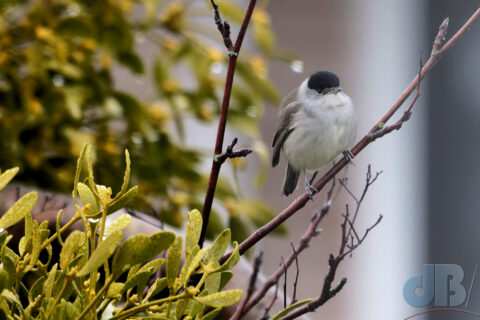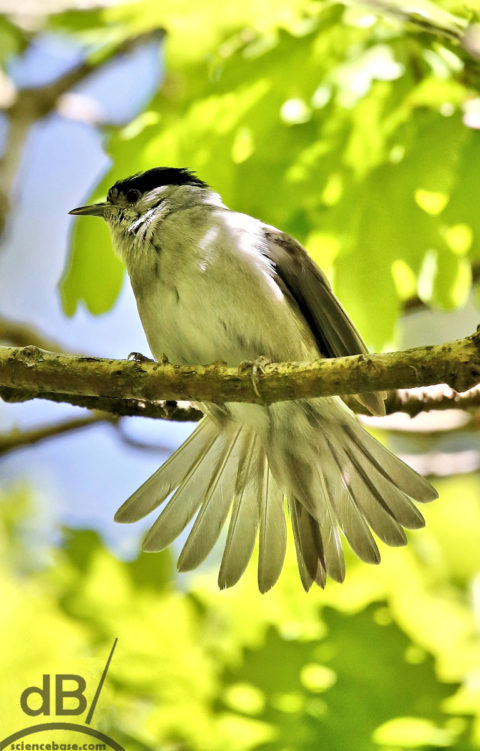TL:DR – There is no evidence that Blackcaps that overwinter in the UK are “demigrating”, they all tend to leave by mid-April. That said, much of their migratory behaviour remains a mystery.
I’ve written about a warbler species we see here in the summer known as the Blackcap, Sylvia atricapilla, several times on Sciencebase. Commonly, for many, many years, thousands in fact, Blackcaps that migrate to the UK in the summer have spent the northern winter in Iberia or North Africa. They migrate north to south and back again, year in, year out.
There is, however, a number of Blackcaps that tend to spend the northern summer in mainland continental Europe, Southern Germany and Austria, for instance. Those in the western part of that region then head somewhat west for the winter to spend the colder months on the Iberian peninsula or in the northern parts of Africa. Those in the eastern part head South East presumably to Serbia, Croatia, Greece etc.

In the last 20-30 years or so there has been a shift in behaviour among these German Blackcaps, ast least the ones in the west. Some of them seem to have lost their internal compass calibration and have been turning up in the UK for the winter instead of the slightly balmier climes of Spain and Portugal. Their internal compass is genetically programmed into these short-lived migratory birds though and so this “mistake” has proven beneficial as it has proliferated in a sub-population of the birds that find well-stocked garden feeders in British gardens. They have thus taken to over-wintering here and then find their way back to the continent for the summer come late March or early April.
Over the last few years, we usually have a male in our Cambridgeshire garden, and one year recently we had both a male and a female. They seem to join in the stripping of mistletoe berries from the trees as well as partaking of the fat balls we hang in the garden. Previously, they have departed in the spring not to be seen again until the winter. We never see Blackcaps in our gardens in the summer, but we do see them in local woodland and these would’ve been birds that overwintered in Iberia and North Africa.

There is now some intriguing evidence that the UK overwintering Blackcaps are not mixing so well with their Iberian counterparts and that we might begin to see speciation taking place. In this, they might ultimately stop interacting and mating and begin to diverge genetically into two sub-species. If the evolutionary pressure is sustained they might one day split into two distinct species.
Now, the male that has been in our garden through the whole of the winter of 2022-2023 has recently been singing rather vigourously from our rowan tree. It was as if he was attempting to establish breeding territory although given his shyness at the feeders compared to the sparrows and even the tits, maybe he was just singing with frustration. Of course, the males do start to sing, or at least partially sing, in March under normal circumstances, perhaps rehearsing for their leading role once they get back to their summer breeding grounds.
I asked Greg Conway of the British Trust for Ornithology (BTO), who has undertaken a lot of research on Blackcap migration about the misinformation that seems to be circulating that claims some overwintering Blackcaps are becoming resident. You can read about work on Blackcap migration in a paper from van Doren et al. on which he is co-author here: https://doi.org/doi/10.1111/gcb.15597
“Virtually all the wintering birds do migrate in the spring and head across the Channel,” he told me. “Currently, there are just a handful of British-bred birds that have remained here to winter, amongst the more than 1000 of ringing recoveries.” He adds that “The winter tracking work did not reveal any resident individuals.”
The bottom line then is that demigration is not happening in Blackcaps. Conway expanded on what I suspected about the behaviour of my own overwintering Blackcap:
“Typically, the wintering birds depart between mid-March and mid-April.,” he explains. “And, just before they go, they gorge themselves at the garden feeders to build fat stores for their long journey. So you might see a bit more feeding activity this week.” He added that I should expect my Blackcap to depart in the next spell of fine weather. Indeed, by the 9th April our overwintering Blackcap had departed.
We know a lot about bird migration and movement but much remains a mystery. I’ve previously discussed the cases of Little, Great White, and Cattle Egrets, Spoonbill, and Glossy Ibis. All of those species have extended their range into the UK over the last few decades. Of course, many migratory patterns have been altered by the ice ages, shifts and changes in environment and food supply, and in the modern age climate change.
“There is still so much we don’t know about Blackcaps and their migratory behaviour,” adds Conway. Licensed ringing and citizen science observations and reporting from birders, of course, are helping build up a picture of what happens. Hopefully, one day we can expect to get a clear understanding of this little bird’s comings and goings. Conway adds that there is also an initiative for reporting ringed Blackcap sightings. If you see any ringed individuals you can send date and place details and whether male (black cap) or female (brown cap, also juveniles have a brown cap) to [email protected]
UPDATE: 24th March 2024 – Having not seen any Blackcaps in our garden this winter, sudden sighting of a male feeding on our mistletoe. So, maybe he’s been around but just not visible. The Merlin app has certainly heard him a couple of times in the last few days when I stick my phone next to our open bedroom window some mornings at 7am-ish. (Our overwintering male Blackcap had departed our garden by the end of the first week of April 2023).